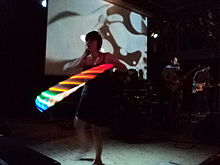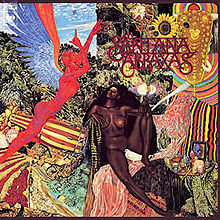- Psychedelia
-
For psychedelics, see psychedelic drug.
The term psychedelic is derived from the Greek words ψυχή (psyche, "soul") and δηλοῦν (deloun, "to manifest"), translating to "soul-manifesting". A psychedelic experience is characterized by the striking perception of aspects of one's mind previously unknown, or by the creative exuberance of the mind liberated from its ostensibly ordinary fetters. Psychedelic states are an array of experiences including changes of perception such as hallucinations, synesthesia, altered states of awareness or focused consciousness, variation in thought patterns, trance or hypnotic states, mystical states, and other mind alterations. These processes can lead some people to experience changes in mental operation defining their self identity (whether in momentary acuity or chronic development) different enough from their previous normal state that it can excite feelings of newly formed understanding ranging from revelation & enlightenment to the opposing polarity of confusion & psychosis.[1] Psychedelic states may be elicited by various techniques, such as meditation, sensory stimulation[2] or deprivation, and most commonly by the use of psychedelic substances. When these psychoactive substances are used for religious, shamanic, or spiritual purposes, they are termed entheogens.
Contents
Etymology
The term was first coined as a noun in 1957 by psychiatrist Humphry Osmond as an alternative descriptor for hallucinogenic drugs in the context of psychedelic psychotherapy.[3] Seeking a name for the experience induced by LSD, Osmond contacted Aldous Huxley, a personal acquaintance and advocate for the therapeutic use of the substance. Huxley coined the term "phanerothyme," from the Greek terms for "manifest" (φανερός) and "spirit" (θυμός). In a letter to Osmond, he wrote:
To make this mundane world sublime,
Take half a gram of phanerothymeTo which Osmond responded:
To fathom Hell or soar angelic,
Just take a pinch of psychedelic[4]It was on this term that Osmond eventually settled, because it was "clear, euphonious and uncontaminated by other associations."[5]
History
Timothy Leary was a well-known proponent of the use of psychedelics, as was Aldous Huxley. However, both advanced widely different opinions on the broad use of psychedelics by state and civil society. Leary promulgated the idea of such substances as a panacea, while Huxley suggested that only the cultural and intellectual elite should partake of entheogens systematically.
The use of psychedelic drugs became widespread in the modern West in the mid-1960s. The movement is credited to Michael Hollingshed who arrived in America from London in 1965. He was sent to the U.S. by other members of the Psychedelic movement to get their ideas exposure.[6]
Modern usage
The impact of psychedelic drugs on western culture in the 1960s led to semantic drift in the use of the word "psychedelic", and it is now frequently used to describe anything with abstract decoration of multiple bright colours, similar to those seen in drug-induced hallucinations. In objection to this new meaning, and to what some[who?] consider pejorative meanings of other synonyms such as "hallucinogen" and "psychotomimetic", the term "entheogen" was proposed and is seeing increasing use. However, many consider the term "entheogen" best reserved for religious and spiritual usage, such as certain Native American churches do with the peyote sacrament, and "psychedelic" left to describe those who are using these drugs for recreation, psychotherapy, physical healing, or creative problem solving. In science, hallucinogen remains the standard term.[7]
In popular culture
In art
Many artists in the late 1960s and early 1970s attempted to illustrate the psychedelic experience. One example of this experimentation is seen in Mati Klarwein's painting Annunciation, which was used as the cover art for Santana's Abraxas. The cover of Pink Floyd's 1968 album A Saucerful of Secrets is also of this type. The cover of Oasis' 2008 album, Dig Out Your Soul, also has a psychedelic album cover, with a slightly muted color scheme.[8]
In music
Main article: Psychedelic musicThe fashion for psychedelic drugs gave its name to the style of psychedelia, a term describing a category of rock music known as psychedelic rock, as well as visual art, fashion, and culture that is associated originally with the high 1960s, hippies, and the Haight-Ashbury neighborhood of San Francisco, California.[9]
One of the first uses of the word in the music scene of this time was in the 1964 recording of "Hesitation Blues" by folk group the Holy Modal Rounders.[10] The term was introduced to rock music and popularized by the 13th Floor Elevators 1966 album The Psychedelic Sounds of the 13th Floor Elevators.[10] Psychedelia truly took off in 1967 with the Summer of Love and, although associated with San Francisco, the style soon spread across the US, and worldwide.[11]
The counterculture of the 1960s had a strong influence on the popular culture of the early 1970s. It later became linked to a style of electronic dance music commonly known as psychedelic trance.
See also
- Entheogen
- God in a Pill?
- Hippie
- Psychedelic art
- Psychedelic drug
- Psychedelic era
- Psychedelic experience
- Psychedelic literature
- Psychedelic music
- Psychedelic plants
- Psychedelic psychotherapy
- Psychedelics, dissociatives and deliriants
External links
- Erowid
- Science & Consciousness Review, The Neurochemistry of Psychedelic Experience[dead link]
- Psychedelic History
- Online archive: Religion and Psychoactive Sacraments
References
- ^ The most reliable measure of confidence to judge one's reality by: Personal experience, confirmed by shared experience seen in observation of others, including testimony from those individuals. --— sloth_monkey 11:34, 15 October 2011 (UTC)
- ^ Psychedelic sensory stimulation exemplified by "The Holotope Experience" utilized by Bashar. Explained in YT video titled "About The Holotope Experience".
- ^ Nicholas Murray, Aldous Huxley: A Biography, 419.
- ^ Janice Hopkins Tanne. Humphry Osmond. PMC 381240. http://www.pubmedcentral.nih.gov/articlerender.fcgi?tool=pmcentrez&artid=381240.
- ^ Martin, Douglas (2004-02-22). "Humphry Osmond, 86, Who Sought Medicinal Value in Psychedelic Drugs, Dies". New York Times. http://www.nytimes.com/2004/02/22/us/humphry-osmond-86-who-sought-medicinal-value-in-psychedelic-drugs-dies.html?pagewanted=2. Retrieved 4 December 2010.
- ^ Grunenberg, Christopher (2007). Jonathan Harris. ed. Summer of Love: Psychedelic Art, Social Crisis and Counterculture in the 1960s (8 ed.). Liverpool: Liverpool University Press. pp. 63-98.
- ^ "Drugs World". Informationisbeautiful.net. http://www.informationisbeautiful.net/visualizations/drugs-world/. Retrieved 2011-10-19.
- ^ "Oasis go psychedelic". BBC. 2007-10-29. http://www.bbc.co.uk/6music/news/20071029_oasis.shtml. Retrieved 2009-04-13.
- ^ M. Campbell, Popular Music in America: And the Beat Goes on (Boston, MA: Cengage Learning, 3rd edn., 2008), ISBN 0495505307, pp. 212-3.
- ^ a b M. Hicks, Sixties Rock: Garage, Psychedelic, and Other Satisfactions (Chicago IL: University of Illinois Press, 2000), ISBN 0-252-06915-3, pp. 59-60.
- ^ V. Bogdanov, C. Woodstra and S. T. Erlewine, All Music Guide to Rock: the Definitive Guide to Rock, Pop, and Soul (Milwaukee, WI: Backbeat Books, 3rd edn., 2002), ISBN 0-87930-653-X, pp. 1322-3.
Wikimedia Foundation. 2010.


